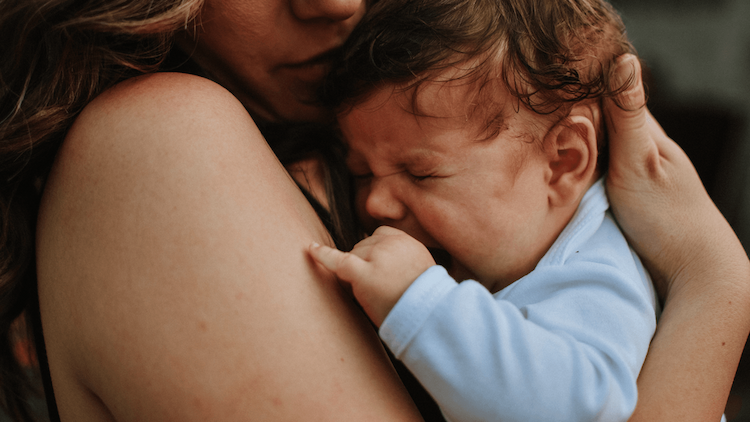12 reasons why your baby isn't sleeping through the night (and how to fix it!)
Sleep is a top priority for every tired parent. Here are 12 common reasons why your baby struggles to sleep through the night or keeps waking up—and practical solutions to help your whole family get the rest you need.

1. Is your baby getting the right amount of sleep during the day and night?
Daytime naps are the secret ingredient to better sleep at night. It might seem counterintuitive, but babies who don’t nap enough during the day often have an even harder time falling and staying asleep at night. Poor nighttime sleep can also lead to oversleeping during the day—and the cycle continues. A consistent sleep schedule tailored to your baby’s needs can help break this pattern.
👉 SLEEP TIP: Try an app like BabyNaps to know exactly when and how often your baby should sleep.
2. Do you have a consistent bedtime routine?
A predictable and calming bedtime routine is key to making bedtime easier and quicker. Start early to help your baby wind down by dimming the lights and slowing the pace. Follow the same steps every evening: maybe a bath, saying goodnight to stuffed animals, reading a book, singing a lullaby, putting on pajamas, giving a gentle massage, or offering a warm bottle. The routine signals to your baby that it’s time to sleep. Over time, this repetition will help your baby relax automatically.
👉 SLEEP TIP: Play the same bedtime music every night (we love this Spotify playlist!), and your baby will associate the songs with sleep.
3. Is your baby showing sleepy cues?
Creating a calm environment can make it easier to spot when your baby is ready for sleep (though we know keeping playtime calm isn’t always simple!). Watch for sleepy cues, and start the bedtime process as soon as you see them.
Common sleepy cues can be:
- Rubbing their eyes
- Slight redness around the eyes or eyebrows
- Yawning
- Becoming quieter
- Lying down on the floor
- Wanting extra cuddles
Make sure most of the bedtime routine is already done by this point.
👉 SLEEP TIP: Starting too late or extending the routine can lead to overtiredness, making it harder for your baby to settle down. Begin winding down at the right time, wait for those sleepy cues, and then head to bed!
4. Are you putting your baby to bed at the right time?
Finding the sweet spot for bedtime isn’t always easy. Research shows that babies tend to sleep longer—and better!—when they’re put to bed earlier in the evening. Many parents mistakenly keep their children awake longer, thinking it will tire them out, but this often backfires and leads to an overtired, fussy baby. Most young children naturally fall asleep between 6:30 and 7:30 PM.
👉 SLEEP TIP: Not sure what time works best for your baby? Try the BabyNaps app for a personalized sleep schedule.
5. Is your baby’s diaper dry all night?
A wet or uncomfortable diaper can disrupt sleep. Experiment with different brands to find one that keeps your baby dry and comfy all night. If you need to change a diaper during the night, use a soft nightlight to avoid fully waking your baby. As your child grows, a familiar light can also provide comfort in a dark room.
6. Is the bedroom cool and quiet?
Babies often sleep better in a cool room. Overheating can disturb their sleep, so aim to keep the temperature around 18°C (65°F). Dress your baby in cozy pajamas with feet and use a light blanket or sleeping bag to keep them comfortable. If your baby tends to kick off the covers, a wearable sleep sack is a great solution. White noise can also help mask disruptive sounds and create a calm sleep environment.
👉 SLEEP TIP: Check out our favorite white noise playlist on Spotify!
7. Is it dark? Like, really dark?
Even the smallest sliver of light can signal to your baby that it’s morning. Invest in blackout curtains to make the room completely dark. If light still seeps in, add a blanket over the curtains. Total darkness is your goal—embrace it!
8. Is the sleeping space cozy?
Newborns love environments that mimic the womb: snug, secure, and surrounded by soft edges. A baby nest or snug sleeping area can provide the comfort they need. For older babies, making the sleep space inviting is key—think favorite stuffed animals, a gentle nightlight, or even starting the night in your bed if that’s what works.
9. Is your baby full?
For newborns, hunger is a big factor in wakefulness. A full tummy can help your baby sleep longer stretches. Try offering a dream feed (a quick feed while they’re half-asleep) before you head to bed yourself.
👉 SLEEP TIP: For babies eating solid food, a small bowl of porridge before bedtime can work wonders.
10. Does your baby fall asleep without too much help from you?
Newborns often need rocking or cuddling to fall asleep, but as they grow, it’s helpful to gradually reduce this assistance. If your baby learns to self-soothe, they’re more likely to fall back asleep on their own during the night (which is a game-changer for everyone!).
👉 SLEEP TIP: Check out the step-by-step guide to teaching your baby to fall asleep independently in BabyNaps app—without tears.
11. Does your baby fall asleep in the same place they’ll sleep all night?
Research shows that babies sleep better when they fall asleep in the same spot where they’ll spend the night. During light sleep cycles, they often “check” their surroundings. If something feels different, like being moved from your arms to the crib, they’re more likely to wake up fully.
12. Is your baby getting enough closeness?
Every baby is different—some thrive with lots of closeness, while others prefer more space. Finding a balance that works for both you and your baby is important. If your baby feels secure knowing you’re nearby, it may reduce nighttime wake-ups.
Suggestions to try:
- Keep the crib close to your bed so you can soothe your baby without getting up.
- Use a mattress on the floor next to the crib for easier nighttime comforting.
- Try a rocking bassinet or crib attachments that gently sway.
And remember: Babies under 3 months should have their own sleeping space to reduce the risk of sudden infant death syndrome (SIDS).
Bonus: Do you have realistic expectations?
If you’re hoping to sleep like you did pre-baby, you might feel disappointed. Night wakings are normal, especially in the first year. Most children continue to wake occasionally until age 3 (!!), and many sleep in their parents’ bed well into their school years. Accepting these realities can help you feel more at peace with the ups and downs of baby sleep ❤️

Evelina Åkerberg
01 June, 2025
Recommended for you

Article
Baby names
Nordic boy names – 50 beautiful names from Sweden, Norway, Denmark, Finland and Iceland
Looking for a name with Scandinavian style and a timeless feel? Nordic names are often short, clean, and easy to pronounce – perfect if you want something that works well both locally and internationally. Here are 50 of the most popular boy names right now across Sweden, Norway, Denmark, Finland and Iceland.

Article
Newborn
How to ease into a routine with your newborn: sleep and feeding tips
How can you gently ease into a sleep and feeding routine with your newborn? How can you help your baby develop a circadian rhythm? And how can routines improve sleep for your little one? Let’s explore how to create a simple routine for your baby.

Article
Development
Fussy baby not sleeping well? Developmental leaps in the first year you need to know about!
Your baby’s first year is a rollercoaster ride. Just when you think you’ve figured things out, a new phase begins—often accompanied by a fussy baby who doesn’t sleep well. Here’s an overview of your baby’s developmental leaps in the first year!
Create YOUR sleep plan – perfectly tailored for your baby!
Say goodbye to struggling to get some sleep. Here, you can quickly create a personalized sleep plan for your baby (completely free). The sleep plan is based on the BabyNaps method. Start right here, right now - create a sleep plan that works for you and your little one!
I want to create my sleep planGet your sleep routine on track - try BabyNaps for free!
Soooo ready to sleep better? Download BabyNaps and get a sleep schedule that works for your baby. The app is free for you for 30 days.